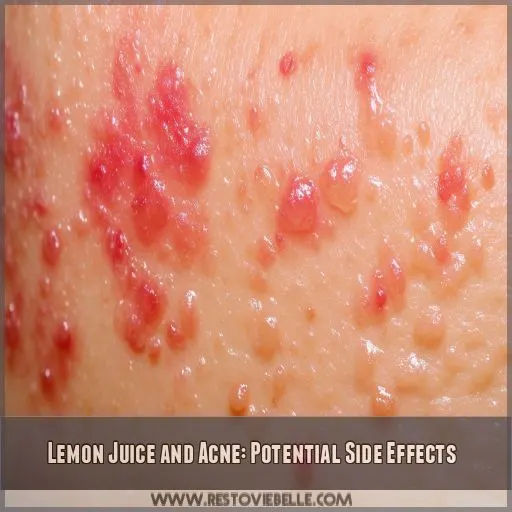This site is supported by our readers. We may earn a commission, at no cost to you, if you purchase through links.

If you’re struggling with acne, you might wonder how to get rid of acne with lemon juice. This citrus fruit is known for its antibacterial and anti-inflammatory properties. However, applying lemon juice directly to your skin has its challenges, including potential irritation.
This article delves into the benefits, correct application, and safety precautions to help you understand how lemon juice can be a part of your acne treatment regimen effectively and safely.
Table Of Contents
- Key Takeaways
- How Do You Get Rid of Acne With Lemon Juice?
- Lemon Juice for Acne: Understanding the Benefits
- Is Lemon Juice Effective for Acne Scarring?
- How to Safely Apply Lemon Juice for Acne
- Lemon Juice and Acne: Potential Side Effects
- The Science Behind Lemon Juice’s Effectiveness for Acne
- Lemon Juice Vs. Other Alternative Acne Treatments
- Lemon Juice for Acne: Precautions and Recommendations
- Frequently Asked Questions (FAQs)
- Conclusion
Key Takeaways
- Pucker up for acne-fighting power! Lemon juice packs antibacterial and anti-inflammatory punches to help tame those pesky breakouts.
- Tread carefully, my friend! Lemon juice can be a bit of a diva on your skin. Dilute it with water and patch test first to avoid turning your face into a lemon-scented disaster zone.
- Don’t let your skin become a dried-out desert! Lemon juice can be drying, so use it sparingly and follow up with a moisturizer to keep your skin happy.
- Know your limits! Lemon juice is best used as a spot treatment or in diluted form. Don’t go overboard or you might end up with a face that’s more sour than a lemon itself!
How Do You Get Rid of Acne With Lemon Juice?
To get rid of acne with lemon juice, mix it with water to reduce its harshness. Apply the diluted mixture to your skin using a cotton ball, but only leave it on for up to 10 minutes.
Lemon juice has anti-inflammatory and antibacterial properties that can help reduce redness and kill bacteria. However, it’s essential to perform a patch test first and discontinue use if irritation occurs.
Be cautious, as lemon juice can cause dryness, sun sensitivity, and hyperpigmentation.
For more insights and safety tips on using lemon juice for acne, keep exploring.
Lemon Juice for Acne: Understanding the Benefits
Lemon juice may help reduce acne due to its anti-inflammatory and antibacterial properties. However, it’s important to use lemon juice safely on the skin to avoid potential irritation or dryness.
Anti-Inflammatory Properties
Lemon juice boasts anti-inflammatory effects thanks to vitamin C and citric acid, which can reduce redness and swelling. Animal studies have supported its anti-inflammatory properties, showing potential to mitigate skin irritation. Additionally, limonene—an active compound in lemon—provides further anti-inflammatory benefits. Applying diluted lemon juice may help calm acne-prone skin, but caution is necessary to avoid irritation.
Antibacterial Effects
Lemon juice possesses remarkable antibacterial properties. By curbing bacterial colonization and potentially mitigating antibiotic resistance, it tackles acne pathogenesis head-on. When applied topically, it can help maintain the skin microbiome. However, be cautious—using lemon essential oil improperly might lead to skin irritation. This natural acne treatment offers a promising alternative to conventional methods.
Application Safety
When using lemon juice for acne, it’s crucial to exercise caution. The citric acid can cause skin irritation, leading to burning, dryness, redness, and increased sun sensitivity. To minimize these risks, always dilute the lemon juice with water before applying, and conduct a patch test first. If any irritation occurs, discontinue use and consult a dermatologist.
- Dilute lemon juice with water before applying
- Perform a patch test before full application
- Avoid applying directly to the skin
- Discontinue use if irritation occurs
- Consult a dermatologist for personalized guidance
Is Lemon Juice Effective for Acne Scarring?
When it comes to acne scarring, lemon juice‘s effectiveness is still up for debate. While animal studies suggest that lemon oil may aid wound healing, there’s limited research specifically on acne scars. It’s crucial to note that applying lemon juice directly to the skin can increase the risk of hyperpigmentation and sun sensitivity. Consulting a dermatologist before trying lemon juice is highly recommended.
Instead, you might consider other treatments like salicylic acid or chemical peels. Lemon-based toners with astringent properties could offer some benefits, but they should be used with caution. So, how do you get rid of acne with lemon juice? Focus on expert advice and explore all options before deciding on your skincare routine.
How to Safely Apply Lemon Juice for Acne
To safely apply lemon juice for acne, follow these steps:
- Dilute Lemon Juice: Mix fresh-squeezed lemon juice with water to reduce its acidity.
- Spot Treatment: Use a cotton swab to apply the diluted juice directly onto pimples, avoiding clear skin.
- Frequency of Application: Start with once a day and increase to twice if no irritation occurs.
- Time of Application: Apply at night, as lemon juice can make your skin sensitive to sunlight.
- Skin Sensitivity: Test the diluted mixture on a small skin patch first; discontinue if you notice any irritation.
Lemon Juice and Acne: Potential Side Effects
While lemon juice can offer some benefits for acne-prone skin, it’s important to be cautious when using it. The citric acid in lemon can cause skin irritation, leading to burning, stinging, redness, and excessive dryness. Some people may even experience allergic reactions or increased sun sensitivity after applying lemon juice.
To minimize these potential side effects, it’s crucial to dilute the lemon juice with water before applying it to your skin. Avoid using lemon juice in combination with other drying ingredients, and limit the application time to no more than 10 minutes. Always rinse thoroughly and follow up with a gentle moisturizer. If you experience any persistent irritation, discontinue use and consult a dermatologist.
The Science Behind Lemon Juice’s Effectiveness for Acne
Lemon juice’s effectiveness for acne lies in its key components. Citric acid helps exfoliate dead skin cells, which can unclog pores and reduce acne.
The antimicrobial properties of lemon oil fight bacteria that cause acne, helping keep your skin clearer.
Additionally, the antioxidants in lemon juice, mainly vitamin C, offer protection against free radicals, promoting healthier skin. Animal studies suggest that lemon oil might support wound healing, potentially reducing acne lesions’ severity and duration.
Although promising, evidence is limited, particularly in humans. Using lemon juice safely, such as diluting it with water and consulting a dermatologist, can minimize potential irritation and maximize its benefits.
Always patch-test first to ensure it suits your skin.
Lemon Juice Vs. Other Alternative Acne Treatments
When comparing lemon juice to other natural remedies and holistic approaches for acne, it’s vital to consider efficacy and safety.
Aloe vera, tea tree oil, and witch hazel are popular topical alternatives known for their antibacterial and anti-inflammatory properties, much like lemon juice. However, these alternatives typically pose fewer risks of irritation and photosensitivity.
Over-the-counter options such as benzoyl peroxide and salicylic acid have proven effective in reducing acne by unclogging pores and killing bacteria, often with clearer dosage and application guidelines.
While lemon juice offers benefits, its potential for causing dryness and irritation might make you consider exploring other natural and over-the-counter options before settling on the right solution for your skincare needs. Choose wisely!
Lemon Juice for Acne: Precautions and Recommendations
When using lemon juice for acne, precautions are key to avoiding unwanted side effects and ensuring safe application. First, dilute lemon juice with water to reduce potential skin irritation. Always do a patch test before applying it to your face to check for any adverse reactions.
To prevent skin irritation:
- Dilute with water.
- Don’t mix with other drying ingredients.
- Limit application time to 10 minutes.
- Protect your skin from sun exposure as lemon juice can increase sun sensitivity.
- Consult a dermatologist before starting any new treatment.
Frequently Asked Questions (FAQs)
Can lemon juice clear acne?
Lemon juice might help clear acne due to its antibacterial and anti-inflammatory properties. However, it can also cause irritation, dryness, and sun sensitivity. Dilute with water, avoid direct application, and consult a dermatologist.
How to treat acne at home with lemon?
While lemon juice has some antibacterial and anti-inflammatory properties, it can also irritate and dry out your skin. For safer, more effective acne treatment, consult a dermatologist about prescription creams or other proven therapies tailored to your skin type.
How to use lemon for clear skin?
Dilute lemon juice with water, then apply to your skin using a cotton ball. Leave it on for 10 minutes, rinse thoroughly, and moisturize. Always do a patch test and consult a dermatologist before use.
How long to leave lemon juice on face?
Leave diluted lemon juice on your face for no more than 10 minutes. This minimizes the risk of irritation, dryness, and sun sensitivity. Remember to rinse thoroughly and moisturize your skin afterward.
Does lemon juice impact oily skin?
Lemon juice can help control oily skin by acting as a natural astringent, reducing excess sebum production. Just be cautious – the citric acid can also dry out and irritate sensitive skin if used excessively. Moderation is key for best results.
Can lemon juice lighten dark spots?
Lemon juice may lighten dark spots due to its vitamin C and citric acid content. However, it can cause irritation, so dilute it with water and consult a dermatologist before use to avoid potential risks.
Whats the pH of lemon juice?
Lemon juice has a pH of around 2, making it highly acidic. This property helps kill acne-causing bacteria, but use it sparingly. Always dilute it and consult a dermatologist, given the skin irritation risks.
How often to apply lemon juice?
Apply lemon juice to your skin 1-2 times daily, diluting it with water first. This can help reduce oil, kill bacteria, and calm inflammation – just be cautious, as it may cause dryness or irritation.
Are there safer citrus alternatives?
Instead of lemon juice, consider using vitamin C-rich oranges or grapefruits. They provide similar benefits without the high risk of irritation. Always dilute with water and test on a small skin area first.
Conclusion
Interestingly, about 85% of people experience acne at some point.
Using lemon juice, with its antibacterial and anti-inflammatory properties, can be a part of your acne treatment regimen.
However, how do you get rid of acne with lemon juice safely? Follow recommended application methods, understand its potential side effects, and consider scientific evidence.
While lemon juice is effective for some, it’s crucial to balance its benefits with safety precautions to achieve clear skin.













